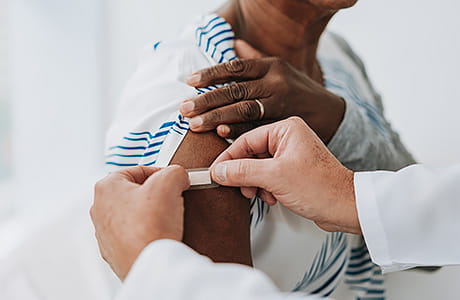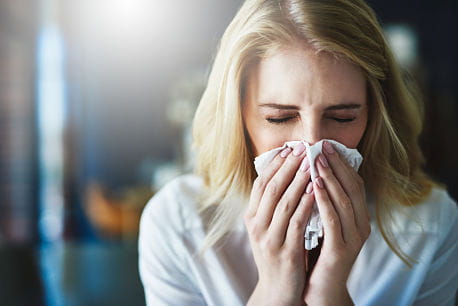Side effects of the COVID-19 vaccine
Here’s how you might feel after getting the COVID-19 vaccine.
Whether you experience some or all of the most common side effects from the COVID-19 vaccine, they’re completely normal, and managing them is easier than you might think. Here’s what you need to know.
A different type of vaccination
The COVID-19 vaccine is given in two doses, administered between 26 and 30 days apart (for Pfizer or Moderna).
Geisinger is administering the Pfizer BioNTech and Moderna COVID vaccines. Due to the way the vaccines are distributed, it’s not possible to choose which vaccine you receive when scheduling your appointment. And your second dose will be from the same manufacturer as the first.
“Because the vaccine is given in two separate doses, it’s important to have both of them for the best chance of effectiveness and protection against COVID-19,” explains Dr. Stanley Martin, system director of infectious diseases at Geisinger.
Unlike a flu vaccine, which uses a protein from the influenza virus, the COVID-19 vaccines that are currently available use something called mRNA.
Messenger RNA (mRNA) is a genetic molecule that is the active ingredient in the COVID-19 vaccine. The mRNA is synthetic, and not extracted from the actual COVID-19 virus.
The vaccines provide the genetic code for your cells to produce viral proteins. These proteins trigger an immune response in your body so you develop immunity against COVID-19.
COVID-19 vaccine side effects: What to expect
After your vaccine, it’s possible to experience one or more of these common side effects:
- Pain or redness at the injection site
- Headache
- Fatigue
- Low-grade fever
- Chills
- Nausea
- Muscle pain/aches
Side effects of the vaccine typically occur between 24 and 48 hours after you receive the injection.
These side effects are normal, Dr. Martin says. “They’re an indication that your body is reacting properly to the vaccine and they should resolve in a few days.”
If you experience any side effects beyond those listed above, contact your healthcare provider. If you have severe symptoms, head to your nearest emergency room or call 911.
Timing is everything
To minimize disruption to your daily routine, think about the timing of your second shot. Consider scheduling your appointment toward the end of the day, close to the weekend or before a day off. That way, if you do experience symptoms, you have time to rest and recuperate.
“Side effects tend to be more prominent after the second dose so plan accordingly, if possible,” says Dr. Martin.
Managing symptoms at home
If you feel under the weather after either dose of your COVID-19 vaccine, it’s easy to treat your symptoms at home. To keep comfortable:
- Take an over-the-counter pain reliever (like ibuprofen or acetaminophen) every 4–6 hours to manage headache or fever
- Drink plenty of fluids, like water, broth or sports drinks
- Rest throughout the day
- Soak in a bath of Epsom salts to soothe aching muscles
- Use or exercise your arm
“Side effects are generally mild", says Dr. Martin. “And they’re usually short-lived. Most go away within 24 to 48 hours.”
If your symptoms worsen, or don’t seem to be going away after a few days, contact your healthcare provider.
What comes next?
Getting your vaccine may feel like a step in the right direction. But the pandemic isn’t over yet, and, Dr. Martin notes, “It’s important not to let your guard down. Continue taking precautions. Wear a mask, wash your hands and practice physical distancing.”
Together, we can reduce the spread and work toward getting back to normal.
Next steps:
Learn more about COVID-19 vaccine safety
Want more content like this? Sign up for our wellness email.





